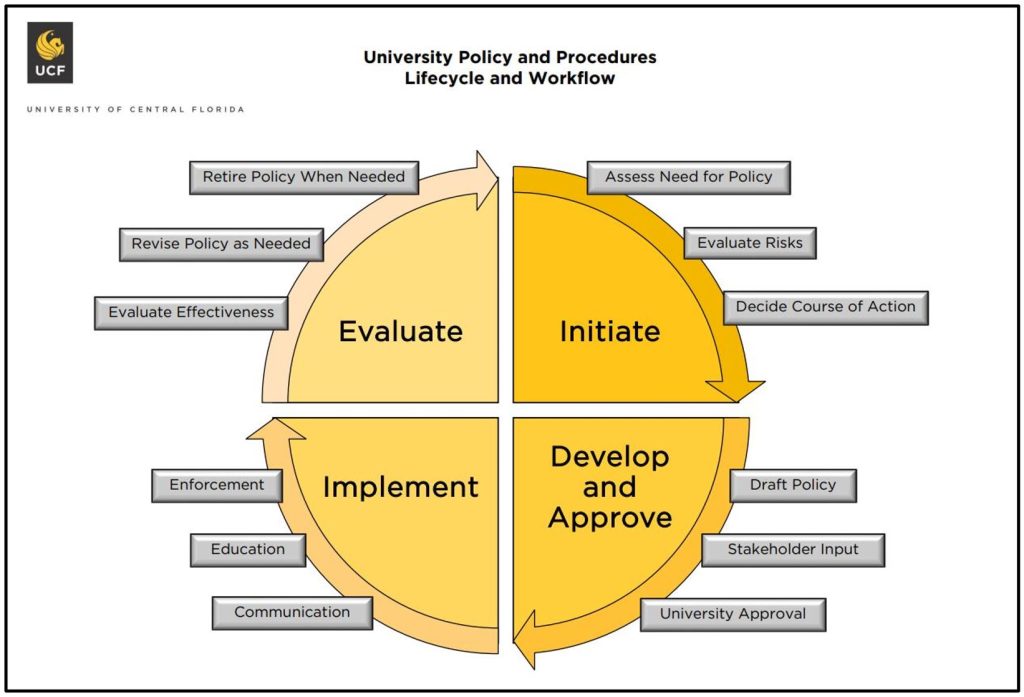 UCF Compliance & Ethics Newsletter
UCF Compliance & Ethics Newsletter
UCF’s Policy Development Process
As part of an effective compliance and ethics program, the university communicates expectations for ethical conduct and compliance with laws through its Code of Conduct and through the development of policies and related procedures. UCF Policy 2-001 University Policy Development dictates the requirements for the drafting of new or revised policies and the procedures to follow when doing so. The UCF Policies and Procedures Manual is the official repository of university policies and related procedures and is available online at the UCF Policies and Procedures website.
University policies require review by the University Policies and Procedures Committee (Committee) and approval by the president before becoming effective except in those circumstances when an emergency policy is required and approved by the president. As such, the president has charged the Committee with suggesting and reviewing university-level policies and procedures. The vice president of university, compliance, ethics, and risk serves as chair of the Committee, has oversight of the policy development process, and maintains the Policies and Procedures Manual.
Policy Development Lifecycle and Workflow
The lifecycle and workflow for developing policies includes four phases: Initiate, Develop and Approve, Implement, and Evaluate.
During the Initiate Phase the need for a new policy is identified, an analysis is performed to determine the potential impact to the university and stakeholders, a policy statement and explanation of the need for the policy is drafted, and subject matter experts are identified.
The Develop and Approve Phase includes the drafting of the policy, a review by stakeholders, a review by University Compliance, Ethics and Risk and by the Office of the General Counsel, the 14-day public comment posting period, a review by the Committee, and review and approval by the president.
The Implement Phase of the workflow process involves university-wide communications by University Compliance, Ethics, and Risk to all UCF employees alerting them of the approval of the new or revised policy. This phase is also where the policy owner educates and trains university employees on the policy and any associated procedures.
Lastly, the Evaluate Phase continuously monitors compliance with the policy and looks at the effectiveness of the policy. This phase consists of annual reviews of the policy by the policy owner and a five-year review requirement by the Committee. If modifications are needed to a policy, the workflow re-starts at the Initiate phase. If policies are determined to no longer be relevant, they are submitted to the Committee to be repealed or retired as appropriate.
Updates to the Policy Development Process
In April 2023, several updates were made to the policy development process and approved by the president to provide more comprehensive procedures and a more thorough stakeholder review by work groups or committees and units across the university. Those updates included:
- Broadened instructions on the policy development process from initiation to implementation,
- The requirement for stakeholder review of a draft policy to include a one-week review period for the Faculty Senate and College Policy Liaisons,
- The implementation of Emergency Policies when needed,
- Explanations for each of the sections to be included when drafting a policy,
- Added templates and required forms, and
- Defined responsibilities for both the Responsible Authority and Initiating Authority.
Please take a moment to read UCF Policy 2-001 University Policy Development to familiarize yourself with the full policy development process requirements at UCF.
Policy Resources
To better assist policy owners with the policy development process, University Compliance, Ethics, and Risk has developed resources to help guide and direct policy owners when drafting new or revised policies. These resources include the policy template, a policy lifecycle and workflow chart, and a comprehensive policy glossary that includes definitions of terms found in all UCF policies. These and more resources can be found online at the UCF Policies and Procedures Resources webpage.
Please also take a moment to read the FAQs in this edition of the IntegrityStar, which provides answers to frequently asked questions and more resources related to the policy development process. University Compliance, Ethics, and Risk is also available to any answer questions related to the policy development process and can be reached by email at complianceandethics@ucf.edu or by phone at 407-823-6263.


